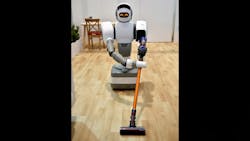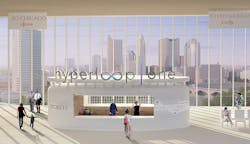It's that time again for the Consumer Electronics Show (January 8-11, 2019 in Las Vegas), which is always one of my favorite weeks of the year to write about technology. Many of the products making their debuts are nascent concepts—teases for what lies ahead. Others, like the automatic laundry folding machine, the Foldimate, have been retooled (and hopefully work better) based on reactions from past shows. You probably won’t be able to purchase, or likely afford, most of the showcased curiosities, but what every product can do is help you to imagine what life in the not-so-distant future might look like.
This year, Dassault Systèmes is making it easier to conceptualize that future (at Booth #4121), allowing you to interact with the smart city of future: one from the year 2030 to be precise. The display will focus on the innovations Dassault expects in the home, life sciences, consumer trends and mobility.
Wanting to know what the general public expects 2030 to look like, the French engineering software giant recently surveyed 1,032 Americans to get their take. Here are some key findings:
- 70% believe they will use remotely monitored devices, voice-activated assistants and fully-connected smart home system
- 40% say it's likely they will have a physical robot in the home
- 75% expect to drive either hybrid or fully electric vehicles
- 51% think it's likely they will travel on a hyperloop rail
- 38% predict they will fly in air taxis
- 81% plan on having devices in the home to dispense medication and treatment
[Head to the bottom of the article for an infographic detailing the results]
Thinking about the future is something I've been doing since I learned the concept of time, pondering the pressing matters of the 1980s, such as when robots would start doing our boring chores, when regular folks with little to no training and zero dedication could go to space, and if it were scientifically possible for me to own a laser gun.
I'm nearly 40 and I truly expected all these to be reality by now. The reality is that technological advancement can be pretty underwhelming. It's nice to see most people would agree with that, specifically on the subject of robots. The carpet-scavenging Roomba vacuum is still the most successful home robot, and that's more of an appliance. It's difficult to think that more than half of America could afford a real physical robot on the scale of Rosie from "The Jetsons," or even R2D2, in the next 11 years. What is more likely is that phones will implement drone technology to hover and move around. They won’t help with the chores, but they will help our increasingly self-absorbed offspring take the perfect selfies.
The only result I find absurd is that a majority of respondents expect the hyperloop to be so ubiquitous that they themselves will ride on it. Currently, there are zero functional hyperloop systems, other than a few test tracks, none of which approach the top speeds of around 700 mph that Elon Musk projects is possible. It's not a guarantee that they ever will. Assuming the science and engineering is figured out, keep in mind how much infrastructure a several-hundred-mile-long, enclosed vacuum tube transport system needs. That more than half of the Americans surveyed, despite being geographically dispersed quite evenly, think they will actually ride one leads me to believe they don't really know what a hyperloop is. Or they watched that Simpsons monorail episode one too many times (if that's possible).
I wanted to find out what Dassualt thought of the findings, which had Florence Verzelen, Dassault Systèmes' Executive Vice President, Industry Solutions, answer my email questions over the holiday break.
IndustryWeek: What do you consider the main takeaways from this survey?
Florence Verzelen: A few things stood out to me. First, technology that is fairly nascent—like the Hyperloop and air taxis—are already on the consumer’s expectation list just 12 years from now. “What if” technology is quickly turning into “When for me” technology and companies need to evaluate and manage those expectations.
Second, it’s clear that personalization is clearly a “must have” for many demographics, and certainly for younger consumers. Companies should realize we have moved from a product economy to an experience economy, which this data reflects.
IW: What are your personal opinions on what 2030 might look like?
FV: I think many of the consumer expectations for technology will become reality. We are working with companies to develop many of these technologies right now. For example, air taxis—we have a few customers in this space. The same with the Hyperloop and autonomous autos. The Life Sciences is also very exciting and poised to deliver on high expectations. For example we have a customer—Biomodex— that is 3D printing exact models of body parts for surgeons to prepare for surgery. We are also working with the FDA on testing medical devices virtually to accelerate their entrance to market.
IW: What is the least likely expectation to happen and why?
FV: I have learned not to underestimate the ability for technology to surprise and delight us, so I’ll pass on answering.
IW: Why does the real future of technology always underwhelm in expectations, but surprise us in unexpected ways? (Like in the 2010s, no hover boards but we got the proliferation of portable smart devices.)
FV: Science Fiction, movies and TV often set expectations for the future but then something like the Apple iPod comes along. None of us knew we needed to “take your whole music library with you in your pocket,” as Steve Jobs memorably said. But once we had the capability, we all decided we did indeed need it! Our history is full of expected outcomes from the pursuit of science and technology, so I can’t wait to see the surprises that will be uncovered in the future.
IW: What is the manufacturing tech you think will help lead to all of these dreams becoming a reality around 2030?
FV: Companies need to move fast to be able to keep up with consumer expectations. But many companies are still doing business in the same way with siloed organizations. Companies need a platform that breaks the silos in their organizations, enabling data to flow freely across teams and true collaboration to occur within the companies but also through with their value network. This advanced level of collaboration around a centralized data set is also crucial to unlocking the latest generation of technological tools—things like additive manufacturing and virtual twins—which will further accelerate the product design process. All those elements are needed for businesses to create the experiences that consumers expect, but cross-organization collaboration is the foundation for everything that comes next.
About the Author
John Hitch
Editor, Fleet Maintenance
John Hitch, based out of Cleveland, Ohio, is the editor of Fleet Maintenance, a B2B magazine that addresses the service needs for all commercial vehicle makes and models (Classes 1-8), ranging from shop management strategies to the latest tools to enhance uptime.
He previously wrote about equipment and fleet operations and management for FleetOwner, and prior to that, manufacturing and advanced technology for IndustryWeek and New Equipment Digest. He is an award-winning journalist and former sonar technician aboard a nuclear-powered submarine where he served honorably aboard the fast-attack submarine USS Oklahoma City (SSN-723).




